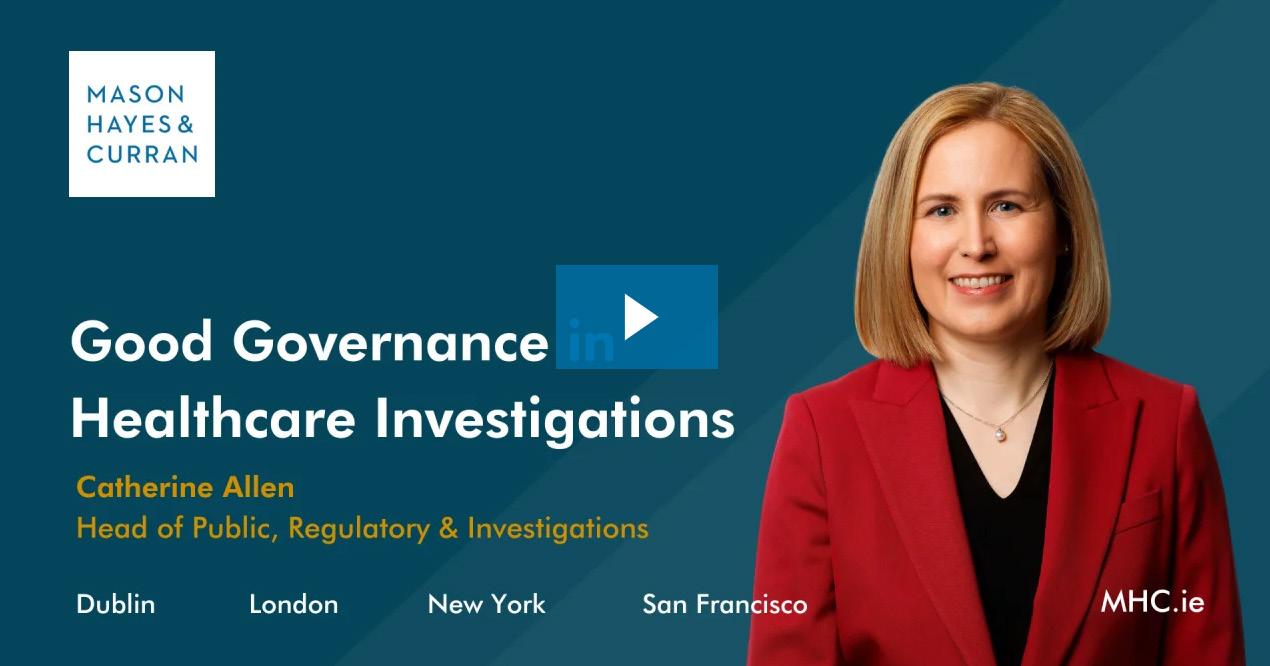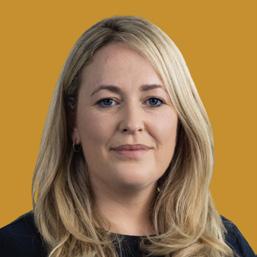
Healthcare Sector Update In Brief Q2 2024

Welcome to the latest edition of our Healthcare Sector Update - In Brief series. In this interactive magazine, we feature our most popular insights from the past month. We hope you find it informative.
First up, in the above video, Head of Public, Regulatory & Investigations, Catherine Allen discusses some of the key governance considerations that stakeholders should be aware of when carrying out healthcare investigations.
Other popular insights featured in this edition include:
• New Initiatives in the Nursing Home Sector
• Martha’s Rule – A New NHS Patient Safety Policy
• Starting a Home Care Business in Ireland
• New Enhanced Role for Pharmacists and Other Prescribers of Medication
Please feel free to contact me or another member of our team if you wish to discuss these topics or any other issues impacting your organisation.

2 Healthcare Sector Update - In Brief
our Healthcare Sector Team
Contact
Welcome Robert Dickson Partner, Healthcare Sector Lead rdickson@mhc.ie
New Initiatives in the Nursing Home Sector
 Eimear Lyons Partner, Corporate elyons@mhc.ie
Eimear Lyons Partner, Corporate elyons@mhc.ie
The nursing home sector in Ireland has evolved in recent years with the majority of nursing home services now being provided by the private sector. While this sector still faces many challenges, new supports have recently been introduced to enable the sector to focus on providing high quality care to meet the needs of Ireland’s growing population. In addition, draft guidance on the design of nursing homes has also been published and is under consideration. In this article, we look at these developments and how they will likely affect longterm residential care services in Ireland.
New design guide for long-term residential care settings
Quality design, planning, and construction is critical when creating safe, high-quality care and ensuring positive experiences for our older population. The Department of Health, in conjunction with the Health Service Executive (HSE) and Health Information and Quality Authority (HIQA) published a draft Design Guide for Long-Term Residential Care Settings for Older People (the Design Guide) at the end of 2023. The proposed Design Guide will apply to long-term residential care settings for older people in public, private, and voluntary facilities. It will be relevant for those:
• Designing a new long-term residential care setting for older people.
• Extending an existing long-term residential care setting for older people.
• Converting/adapting a building that is not currently registered as a residential care setting, for example, a hotel.
• Refurbishing/retrofitting/renovating an existing long-term residential care setting for older people.
Key points
• It is proposed that HIQA will use the Design Guide to inform applications to register a new designated centre for older people (nursing home) or vary an existing centre’s registration.
• The Design Guide will not be applied retrospectively.
• New build long-term residential care settings, extensions to existing residential care settings, and conversions/adaptations of a building that is not currently registered as a residential care setting for older people will be expected to comply with the Design Guide.
• HIQA will ask applicants to provide detailed plans and information so that inspectors can consider the suitability of the applicant’s plans and can suggest improvements, where appropriate. The inspector’s comments during the pre-application registration advice process will not guarantee registration. However, they will be able to alert applicants to areas that do not comply with the relevant regulations, standards, and best practice.
3 Healthcare Sector Update - In Brief Financial Services Sector Update - In Brief
• HIQA’s pre-application registration advice process should be completed before a planning application is submitted to a planning authority, and before inspectors approve in principle the design and proposed location of the facility.
• It is expected that planning authorities will consult the Design Guide when making a decision on a planning application or during the pre-planning advice process.
• It is recommended that long-term residential care settings for older people should have no more than 84 residents in total.
• The Design Guide includes recommendations for interior design, bedroom layout, communal areas, infection control and staff areas and the following are particularly noteworthy:
1. Long-term residential care settings adopt the Household/Teaghlach model of residential care with a maximum of 12 residents per household.
2. Each household should be accessible without having to travel through other households and must have the ability to operate independently and be self-contained if required. The design guide refers to each household requiring an identifiable entry.
3. Newly built residential care settings should consist of single-person bedrooms unless there is a specific requirement for some twin/ double bedrooms to meet the needs of some residents.
4. Buildings of more than one floor should provide safe, independently accessible outdoor space, such as a balcony or roof garden, that provides contact with nature for each small group setting.
The public consultation on the Design Guide closed on 15 February 2024 and we understand that the feedback is under review.
It will be interesting to see if the sectors’ concerns about the proposed household model and the cap on nursing home beds will be addressed with HIQA when the Design Guide is published. We need to wait to see how the Government will deal with such challenges to ensure that the sector develops as it should.
Due to economies of scale, compliance with the Design Guide will prove challenging for investors and operators without supplementary supports.
Resident Safety Improvement Scheme (RSI Scheme)
A new €10 million scheme has recently been established to support improvements in resident safety through funding support for the implementation of compliance plans consistent with the standards published by HIQA regulations published in 2013.
Key points
• The launch date for the RSI Scheme is 1 January 2024, and the closing date for applications is 15 November 2024.
• The RSI Scheme is open to all operational voluntary and private nursing homes registered with HIQA and the National Treatment Purchase Fund (NTPF) as of 1 January 2024.
• Nursing homes that have previously conducted structural works covered under the RSI Scheme can claim the cost of these works if they were carried out from 1 January 2020 to the commencement of this scheme (1 January 2024).
• All works claimed will be subject to inspection.
• This vouched scheme will have claims processed by the NTPF and all payments from the scheme shall be approved and processed and distributed by the HSE on a quarterly basis.
• All claims under this scheme must not have been submitted or previously reimbursed for under any previous scheme or grant.
• The upper limit available for each individual nursing home to claim is €25,000. All claims must be made for each nursing home facility individually.
4 Healthcare Sector Update - In Brief
The permitted works covered under the RSI Scheme are as follows:
• The installation of additional/sufficient clinical hand wash sinks that meet the required standard.
• The upgrading of sluice facilities within appropriate nursing homes.
• The upgrading of cleaners’ rooms within the nursing home for the following items:
1. Improving the ventilation within the cleaner’s room.
2. The installation of a stainless-steel sink / wash hand basin within the cleaning room for hand sanitisation purposes.
• The installation of additional signage for infection control measures.
• The installation of approved fire doors by a competent fire safety professional.
• The provision of appropriate fire safety / firefighting equipment.
• The improvement of emergency lighting and fire alarm systems and installation by a competent fire safety professional.
• The installation of appropriate fire safe fillings into holes created for essential wiring and plumbing facilities by a competent fire safety professional.
• Reconfigurations required to comply with certain aspects of the HIQA regulations published in 2013.
New postgraduate programme aimed at the nursing home sector
The Government recently announced €3.2 million in State support for a new postgraduate programme aimed at the nursing home sector. It has been developed in response to recommendations in the COVID-19 Nursing Homes Expert Panel report and will provide support for over 440 registered nurses in private nursing homes to obtain a Postgraduate Diploma in Gerontological Nursing.
Key points
• This new programme will be managed by LHP Skillnet on behalf of the Department of Health.
• The funding allocation will be provided over two years and will provide funded places in the academic years 2024/2025 and 2025/2026.
All private nursing homes will be invited to apply for one QQI Level 9 Gerontological Nursing Qualification placement over this period.
Comment
The nursing home sector’s dissatisfaction with the NTPF (or Fair Deal) scheme and its challenges with rising employment costs and the staff accommodation crisis are well publicised. Operators, investors, the Government and other stakeholders must work together to continue to develop the sector to meet the needs of our growing elderly population. The new measures and supports which have recently been introduced or are proposed demonstrate positive steps towards such collaboration and it will be interesting to see the impact the various changes and supports will have on the sector in the coming months.

5 Healthcare Sector Update - In Brief
Martha’s Rule – A New NHS Patient Safety Policy
 Kevin Power Partner, Head of Medical Law kpower@mhc.ie
Kevin Power Partner, Head of Medical Law kpower@mhc.ie
Martha Mills was only 13 years old when she sadly passed away in 2021 in King’s College Hospital (King’s) in London. She had a biking accident when on holiday with her family. It later emerged that she had sustained pancreatic damage. Her condition was not believed to be life threatening when she was transferred to King’s, a paediatric pancreatic trauma centre. During her time in King’s, despite her parents raising concerns about her deteriorating condition with staff, Martha developed sepsis. This new policy for access to rapid review for patients has come about as a result of advocacy by Martha’s parents, in an attempt to ensure that similar outcomes are avoided in the future.
Martha’s Rule
The NHS website states that this new funded policy will be adopted through a phased approach. It will begin with at least 100 adult and paediatric acute provider sites which already offer a 24/7 critical care outreach capability. There is no legislative basis for this policy.
There are three elements to the new policy, as per the NHS website, as follows:
• “All staff in NHS trusts must have 24/7 access to a rapid review from a critical care outreach team, who they can contact should they have concerns about a patient.
• All patients, their families, carers, and advocates must also have access to the same 24/7 rapid review from a critical care outreach team, which they can contact via mechanisms advertised around the hospital, and more widely if they are worried about the patient’s condition.
• The NHS must implement a structured approach to obtain information relating to a patient’s condition directly from patients and their families at least daily. In the first instance, this will cover all inpatients in acute and specialist trusts.”
In Irish hospitals, second opinions on patient care are often obtained on a case by case basis. The distinction is that there is no formal system of access to a funded rapid review of patient care in operation in Ireland at present.
Inquest and subsequent events
The inquest into Martha’s death concluded in February 2022. The Coroner found that her medical cause of death was refractory shock, sepsis, pancreatic transection and abdominal trauma. The Coroner raised concerns and prepared a ‘Prevention of Future Deaths report’. In this report, the Coroner found that whilst at King’s, Martha was not promptly referred to the paediatric intensivists. She found that if she had been referred promptly and appropriately treated, the likelihood is that she would have survived her injuries. The Chief Executive of King’s submitted a response including a section agreeing that the escalation of care process needed to be refined and formalised.
Martha’s mother, Merope Mills, is an editor at the Guardian newspaper. She published an article in September 2022 in that paper which was highly critical of the care provided to her daughter.
6 Healthcare Sector Update - In Brief Financial Services Sector Update - In Brief
She listed the series of errors which she believed had led to her daughter’s premature death. Following this, Merope was contacted by the think tank Demos. Demos published a report in September 2023 proposing Martha’s Rule. The Rule was proposed to “rebalance the power between patients and medics with one purpose only: to improve patient safety.” The Rule was based on several pre-existing models of rapid care review.
International patient safety models
In Australia, the health system in the state of Queensland developed Ryan’s Rule. This followed the death of Ryan Saunders in 2007 from an undiagnosed streptococcal infection, which led to toxic shock syndrome. Similarly to Martha’s case, Ryan’s parents had concerns that he was deteriorating and did not feel the clinicians acted expeditiously. In this Queensland system, patients or families call a dedicated phone number advertised in the hospital and ask for a Ryan’s Rule Review. A Ryan’s Rule nurse will then come and assist.
The University of Pittsburgh has a system called Condition H(elp). Patients and relatives call an inhospital number and a rapid response review team will attend.
Closer to home, an NHS trust in Berkshire, England, already operated a Call 4 Concern model. Patients and their families can contact an in-hospital critical care outreach team if they have concerns about their own condition or a loved one’s condition.
The Demos report states that evaluations of the above three systems have been positive. There is no evidence of overuse or abuse of the system.
The English health secretary announced that the government would be committing to bringing in the proposed Martha’s Rule in September 2023. The head of the NHS confirmed that Martha’s Rule will be rolled out in English hospitals from April 2024.
Conclusion
Questions remain as to how exactly Martha’s Rule will operate on a day to day basis. On a practical level, it will be colleagues of the treating clinicians who will carry out the review. There has been some criticism from clinicians regarding the ambiguity of the Rule and the framing of access to a review team as a ‘right’. Despite the criticisms, Martha’s Rule has the potential to amplify concerns regarding patient care, thereby improving patient safety.
We will watch with interest as Martha’s Rule is implemented in England. It remains to be seen if a similar approach is adopted elsewhere.

7 Healthcare Sector Update - In Brief
Starting a Home Care Business in Ireland
 Eimear Lyons Partner, Corporate elyons@mhc.ie
Eimear Lyons Partner, Corporate elyons@mhc.ie
As Ireland faces an increasing aging population, there is great demand for home care and support services. Currently, there is no statutory regulation of home care services in Ireland. However, regulation of this sector is expected this year. It is understood that the Department of Health is currently finalising the new statutory scheme for home support services in line with its Programme for Government and Sláintecare commitments.
When introduced, the new law will require homecare and home support providers to hold a license from the Health Information and Quality Authority (HIQA) before they can operate. HIQA will also be charged with monitoring and managing compliance by public, private, and not-for-profit providers of home care and home support services under the new scheme.
In this article, we briefly review some of the key considerations when setting up a home care business in Ireland.
Key considerations Legal structure
It will be necessary to choose a legal structure for your business. The different structures are important in terms of the different taxes you will be required to pay. We would recommend that you seek tax advice when considering starting your business. It is often the case that home care businesses are set up as limited companies, especially where a number of carers are employed or will be employed to provide the services.
Therefore, a new company will need to be registered with the Company Registration Office (CRO). This registration process involves appointing at least one company director, a company secretary and preparing and filing a company constitution, which is essentially the rulebook for the company.
Business or trading name
A first step in setting up is to choose a name for your business. It is advisable to choose a name that informs customers about the nature of your business and distinguishes your business from your competitors. It is also important to be mindful of the business names already registered or used by your competitors. In many cases, a business can use the same company name and trading or business name. However, this is not required and is not always possible. For example, your preferred business name may not be available as a company name as it may already be used by another business, or the name may not be suitable for registration purposes and will be rejected by the CRO. In these circumstances, you may wish to register a company name and then a different business name to trade under. A business name registration is separate to a company incorporation and also needs to be registered with the CRO.
Tax registration
When you start a business and incorporate a new company, the Revenue Commissioners (Revenue) will need to be informed. It is advisable to seek tax advice at an early stage.
8 Healthcare Sector Update - In Brief Financial Services Sector Update - In Brief
To register for tax you must have a company registration number as issued by the CRO.
Banking matters
A company bank account will need to be opened. The bank will require certain corporate governance documents before opening a new account. These will include a copy of the certificate of incorporation of the company, its governing documents, verifications regarding the identity of the director(s), and tax registration details.
Compliance with employment laws
All employers are required to comply not only with general Irish employment laws but also with any home care sector specific regulations. The proposed new regulations will require employers to comply with specific staffing requirements such as each home-support worker having certain minimum qualifications, the provision of induction training, health and safety training and other provisions relating to employment terms, education, training, and supervision. Home care workers with access to vulnerable people must be Garda vetted. Also, if home care workers from outside the EEA will be employed, visa and work permits will be required.
Insurance
Obtaining comprehensive business insurance is advisable. Any insurance should cover any accidents or injury involving employees, clients or a member of the public. It should also cover any loss or damage to property and for any matters relating to allegations of negligence or abuse.
Comply with the new regulations
As highlighted, the new regulatory framework is expected to be implemented shortly. As such, anyone contemplating setting up a new home care business should become familiar with the new law to ensure that the business can comply with the new obligations. For more information on the proposed new statutory scheme, please see our previous article
Consider applying to become a HSE approved home-support provider
A home-support provider may wish to apply via a tender process to become a HSE ‘approved homesupport provider’. An approved service provider may be engaged and paid by the HSE to provide services to people where the HSE are not available to deliver the service. A successful candidate must comply with all of the service specifications laid out in the tender.
Conclusion
With the projected increase in our ageing population, we need to prepare for the increasing demand for home care and support services in our communities. New or aspiring home care businesses should not only consider the usual matters when setting up a new business, but also carefully consider the new regulations to ensure they are in a position to comply with these new laws when they are implemented.
If you are a home care or support service provider and have any questions or queries regarding your business, please contact a member of our Healthcare or Corporate teams.

9 Healthcare Sector Update - In Brief
New Enhanced Role for Pharmacists and Prescribers of Medication
 Aoiffe Moran Partner, Public, Regulatory & Investigations amoran@mhc.ie
Aoiffe Moran Partner, Public, Regulatory & Investigations amoran@mhc.ie
New regulations have come into force to enhance the role of pharmacists in the delivery of community healthcare. Under the new measures, pharmacists are now able to extend the validity of certain prescriptions to a 12-month maximum. The regulations also permit doctors and other prescribers, such as nurses and dentists, to write prescriptions for up to 12 months where it is clinically appropriate.
The measures allow prescriptions to be written by the prescriber, including doctors, dentists, and nurse prescribers, where appropriate for a period of up to 12 months. Where the prescription provided is for more than six but less than 12 months, a patient can ask their pharmacist to consider extending it up to that limit from 1 September 2024 where it is issued on or after 1 March 2024.
When this is requested, the pharmacist must carry out an assessment of the appropriateness of extending the prescription, whether the patient has an ongoing need for that medication, and if it is in their best interests. This can be in consultation with the prescriber, if they consider it necessary. These measures enhance the need for collaboration between the healthcare professions involved to discuss and collectively consider how best to manage the patient’s care. Prescribers can also indicate on prescriptions that an extension would not be in the best interests of the patient at the time the prescription issues.
This legislation builds on temporary measures introduced during the COVID-19 pandemic, which allowed pharmacists to extend certain prescriptions to up to nine months, where they considered it clinically appropriate. The aim at that time was to ensure patients had continued access to regular treatment and to ease the additional burden on prescribers and pharmacists for those requiring ongoing treatment. Where a valid prescription was in place, a pharmacist could take the decision to extend it where, in their professional and clinical judgement, the patient required ongoing treatment and it was safe and appropriate in all the circumstances.
Similarly, these new changes are aimed at ensuring that those on extended treatment have ongoing access to necessary medications, while also freeing up clinical time to assist those in need of additional support.
The measures do not apply to all medication. For instance, controlled drugs are not eligible for extension. However, many standard medications will be included. This is the first of what is expected will be a series of measures from an Expert Taskforce established to support the expansion of the role of pharmacists.
10 Healthcare Sector Update - In Brief Financial Services Sector Update - In Brief
Conclusion
The extension should be welcomed by patients, and overburdened healthcare professionals. However, it imposes a separate burden on those professionals affected to ensure that they exercise their professional judgement appropriately. It is important for those healthcare professionals to consider issues such as:
• The necessity for ongoing treatment
• Patient safety
• The appropriateness of an extended prescription for the patient concerned, and
• The views of others involved in the patient’s care
The Pharmaceutical Society of Ireland, the pharmacy regulator, is developing updated guidelines to support pharmacists with this development. We expect that guidance documents will also issue from other regulatory bodies. Time should be taken to review the details of this guidance and to ensure compliance with it in both the interests of the patient, and the profession to work within their scope of practice.
For more information and expert advice, contact a member of our Public, Regulatory & Investigations team.

11 Healthcare Sector Update - In Brief
Healthcare Sector team
We have the largest healthcare team in Ireland whose expertise and experience ensure that we deliver targeted, high-quality, sector-specific advice.
Our team is drawn from specialists across the firm and is comprised of lawyers having backgrounds in industry, science, and medicine.
We advise a variety of organisations involved in the provision and development of healthcare services and other businesses which support the healthcare sector. We also act for established public and private hospitals and voluntary organisations and governmental and non-governmental organisations.
Our dispute resolution practice is unrivalled, and we have been involved in many of the leading Irish medical negligence cases.
We have specialist experience advising on healthcare transactions including acting for real estate investors, Irish and international investors, operators and for healthcare technology, pharma and MedTech companies.
Advising on procurement, contract law, data protection, compliance and regulatory matters is a core part of our service to healthcare clients.
About Us
We are a business law firm with 117 partners and offices in Dublin, London, New York and San Francisco.
Our legal services are grounded in deep expertise and informed by practical experience. We tailor our advice to our clients’ business and strategic objectives, giving them clear recommendations. This allows clients to make good, informed decisions and to anticipate and successfully navigate even the most complex matters.
Our working style is versatile and collaborative, creating a shared perspective with clients so that legal solutions are developed together. Our service is award-winning and innovative. This approach is how we make a valuable and practical contribution to each client’s objectives.
What Others Say
Dublin London New York San Francisco The contents of this publication are to assist access to information and do not constitute legal or other advice. Readers should obtain their own legal and other advice as may be required. © Copyright 2024. Mason Hayes & Curran. April 2024. Healthcare Sector Update - In Brief
Our Healthcare Team Our Healthcare Team Chambers & Partners Legal 500
Hayes & Curran is very strong on tactics and how to deal with all matters in a timely fashion.”
passionate and on top of their sector”. Contact our Healthcare Sector Team
“Mason
“Energetic,




 Eimear Lyons Partner, Corporate elyons@mhc.ie
Eimear Lyons Partner, Corporate elyons@mhc.ie

 Kevin Power Partner, Head of Medical Law kpower@mhc.ie
Kevin Power Partner, Head of Medical Law kpower@mhc.ie

 Eimear Lyons Partner, Corporate elyons@mhc.ie
Eimear Lyons Partner, Corporate elyons@mhc.ie

 Aoiffe Moran Partner, Public, Regulatory & Investigations amoran@mhc.ie
Aoiffe Moran Partner, Public, Regulatory & Investigations amoran@mhc.ie
